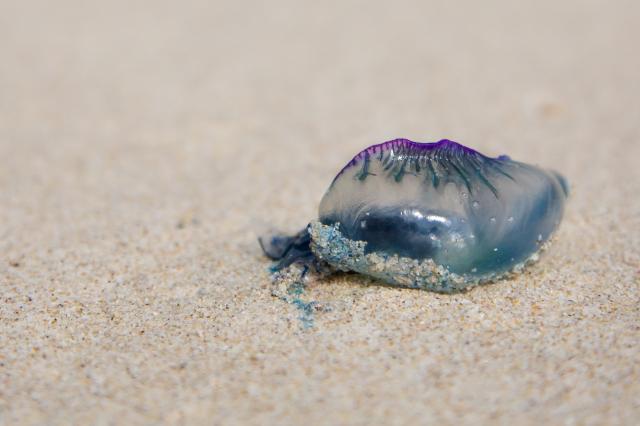Elsie Adamo
BLUEBOTTLE jellyfish have been washing up on beaches around the region, causing a hazard for summer swimmers.
Sighted at Beachport, Southend, Robe and Port MacDonnell, the unwelcome visitors have arrived just in time for the beach tourist season.
Not to be confused with the potentially deadly blue-ringed octopus, bluebottle stings are not life-threatening but can be very painful to the recipient.
Dr Lisa Gershwin, director of the Australian Marine Stinger Advisory Services and an expert on jellyfish, said it was unusual for them to be spotted on South Australian beaches at all.
“They have these big populations out in the open ocean, and when the winds are just right it blows them into areas where we do not see them most of the time,” Dr Gershwin said.
“We do not get them very often in South Australian waters.”
If you see a bluebottle, Dr Gershwin said the best rule of thumb is do not touch them when as you can see blue on them.
“The stingers work on a hair-trigger mechanism, the owner can be well and truly dead but they can still sting,” she said.
“Even if it is dead and crispy dry it can still sting you as soon as it gets moist.
“If you pick a dry one up on a hot summer’s day, you may not even notice the moisture on your hand but all of a sudden it starts really stinging.
“I know it looks like they can be fun to pop, but do try to resist.
“A sting will definitely make children cry, and some adults too, like myself.”
Extra care should be taken with pets on the beach, to avoid dogs getting stung on a paw or in their mouth.
If you do get stung, official advice is to rinse with salt or sea water, and then use ice or hot water for the pain.
“A lot of people forget the sea water rinse and that is a big mistake,” Dr Gershwin said.
“When you put fresh water on a marine sting like a bluebottle, it actually forces an immediate and massive discharge of all of the stinging cells that have not injected venom yet.
“And that can go very badly if that happens, it is a lot of venom to take on.”
While bluebottles may be an unwelcome guest, their presence often means some other interesting, and less dangerous, sea life can end up on our beaches.
“They are just one species in a whole community of really weird stuff that travel the high seas together, and the other creatures usually wash up with them as well,” Dr Gershwin said.
“These are creatures, particularly in this area, you just do not get to see very often,” she said.
“If you want to walk between the bluebottles, have a look at some of these other things.”
Velella or ‘By-the-Wind Sailors’, along with sea lizards, otherwise known as the Pokémon slug, may be spotted along the beaches as well.








